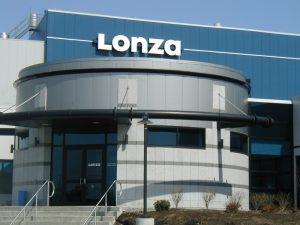Lonza plans to bolster its mid-scale biomanufacturing and cell therapy capabilities at its site in Portsmouth, New Hampshire on the back of growing demand.
The expansion will include mid-scale mammalian capacity through the installation of several 6,000 L bioreactors which will eventually replace stainless steel 5,000 L systems operating at the site.
“This will be a hybrid facility combining stainless steel for the main reactor with single use technologies for some of the upstream and downstream processing,” Sylke Hassel, SVP for Mammalian Manufacturing at Lonza Pharma & Biotech told BioProcess Insider.
“When planning this new facility we considered all the options and came to the conclusion that this combination was best for our customer needs in midscale.”
Lonza uses single-use 2,000 L technology at its biomanufacturing plant in Singapore, and “this new 6,000 L complements existing capacity nicely.”
The expansion will support current customer projects and feed future demand for mammalian biomanufacturing, Hassel added.
The contract development and manufacturing organization (CDMO) did not divulge the size of the investment.
95,000L Bioreactor Capacity
Lonza’s Pease, Portsmouth site – located about 100 km north of Boston – currently houses three mid-scale 5,000L bioreactors and four stirred 20,000L systems for large-scale mammalian cell culture. The site also houses several purification suites.
Today’s news comes a fortnight after the CDMO received the go-ahead from the Pease Development Authority.
Details of the authorized expansion sent to Lonza’s COO Mark Funk ahead of a meeting held April 20 described the facility – ‘Building 1’ – to have a 395,000 ft2 footprint and height of approximately 120 ft when completed in 2021.
The CDMO will also be paying US$16,845 per acre for the first five years for leasing the new land.
Lonza also plans to build a second and third new building on the site, depending on the market demands of its customers, the documents show.
Cell and Gene Therapies
The expansion will also include several cell therapy suites intended to serve both current customers and to anticipate growing demand.
While the Portsmouth will not have viral vector manufacturing capbilities, it will complement Lonza’s cell and gene therapy offering which was recently boosted by the opening of what it describes as the world’s largest dedicated cell and gene therapy facility in Pearland, Texas.
“Texas and Portsmouth are both part of our global network designed to give customers access to expertise and flexible assets,” Andreas Weiler, head of Emerging Technologies at Lonza told us.
“Portsmouth will focus on clinical and commercial manufacturing for cell therapy whereas Houston also covers process development and viral vector manufacturing (for cell and gene therapy).”
He added the two are sites both positioned close to big biotech and healthcare hubs – Boston and Houston – which is necessary as with “many of these innovative therapies, proximity to the patient is key.”

